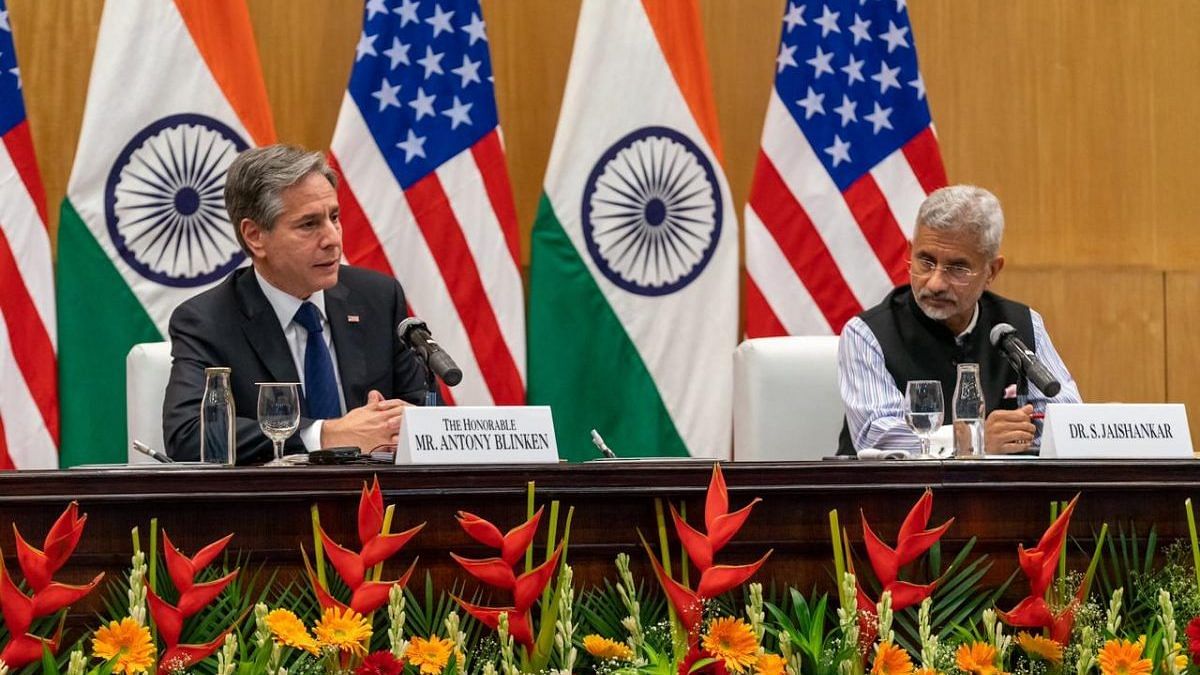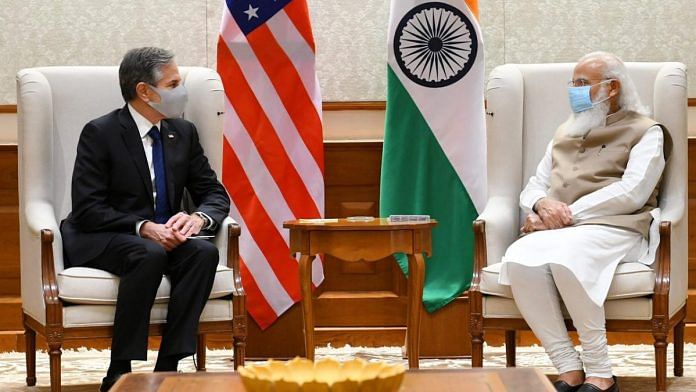New Delhi: US Secretary of State Antony J. Blinken’s visit to India might have been for less than 24 hours but it did have some strong messages for Beijing while he also ensured that New Delhi and Washington would work in tandem to make sure Afghanistan remains stable with a democratically-elected government.
Blinken, who embarked on his maiden visit to India Tuesday, met some of the key representatives of the Tibetan resistance movement in New Delhi Wednesday, even as he stressed on the need to have a rules-based order within the Indo-Pacific strategic construct.
While the US Secretary of State met Geshe Dorji Damdul, Director, Tibet House, during a roundtable with civil society representatives, he held a separate meeting with Ngodup Dongchung, representative of Tibetan spiritual leader the Dalai Lama.
Dongchung is also a key figure in the Central Tibetan Administration (CTA) or the Tibetan government-in-exile.
The meeting between Blinken and representatives of the Tibetan resistance movement comes in the wake of Chinese President Xi Jinping’s visit to the city of Nyingchi in Tibet last week.
“Peace and prosperity in the Indo-Pacific are as important for both of us as democratic stability in Afghanistan,” Blinken said at a joint media conference with External Affairs Minister S. Jaishankar even though he did not mention China even once publicly during the entire trip.
India, sources told ThePrint, was not aware that the US had organised such a meeting and was informed about it only hours before Secretary Blinken met Dongchung.
“At a time of rising global threats to democracy and international freedoms — we talk about a democratic recession — it’s vital that we two world-leading democracies continue to stand together in support of these ideals,” Blinken said while addressing the roundtable.
He also said India stands for “free media, independent courts, a vibrant and free and fair electoral system — the largest expression of free political will by citizens anywhere in the world” and hence it is important that both countries work together to maintain such ideals.
During the roundtable meeting with civil society groups, the US Secretary of State also discussed issues concerning the Citizenship Amendment Act and the ongoing farmers’ protests among others even as he raised issues concerning democratic principles, human rights, and freedom with his Indian counterpart Jaishankar, the sources said.
“Our shared values, our shared democratic traditions, the high ideals that we both have set for ourselves were very much part of our conversation today as they usually are,” Blinken said. “The relationship between our two countries is so important and so strong because it’s a relationship between two democracies and at its core, our relationship is between our peoples… We talk about these issues as friends.”
Jaishankar also stressed that freedoms were important.
“Freedoms are important; we all value them but never equate freedom with non-governance or lack of governance or poor governance. They are two completely different things,” he said.

‘Quad is not a military alliance’
China has always been opposed to the concept of Indo-Pacific as well as Quad, a grouping between the US, India, Japan, and Australia.
At the media conference, Blinken clearly said the Quad is “not a military alliance”.
“Its purpose again is to advance cooperation on regional challenges while re-enforcing international rules and values that we believe together underpin peace, prosperity and stability in the region,” he said.
The US, under the Joe Biden administration, had outlined in its first days of coming to power that it is serious about the Quad even as it organised a virtual ‘Quad Summit’ meeting among the leaders of the member countries in March 2021.
According to Jaishankar, “India has interests far beyond its immediate borders.”
He said: “In a more complicated world with a lot of new challenges, when we talk of rebalancing, we mean different countries whose capabilities have grown or have changed and who are enlightened enough to work with each other.”
Doha talks have to continue for lasting peace in Afghanistan
On the deteriorating situation in Afghanistan, both sides agreed the peace talks between the Afghan government and the Taliban must continue for stability in that country, admitting the situation there is “deeply troubling”.
Blinken said while the US may be withdrawing its troops from there, the country “will remain very much engaged” in Afghanistan in support of the Ashraf Ghani government.
“An Afghanistan that does not respect the rights of its people, an Afghanistan that commits atrocities against its own people would become a pariah state,” he said.
The issue of Afghanistan was also raised by Blinken during his meetings with Prime Minister Narendra Modi and National Security Advisor Ajit Doval, whom he also met Wednesday.
PM Modi later tweeted about the meeting. “Good to meet US Secretary of State @SecBlinken today. I welcome President Biden’s strong commitment to strengthen the India-US Strategic Partnership, which is anchored in our shared democratic values and is a force for global good,” he posted.
Good to meet US Secretary of State @SecBlinken today. I welcome President Biden's strong commitment to strengthen the India-US Strategic Partnership, which is anchored in our shared democratic values and is a force for global good. pic.twitter.com/HlNqKVTM95
— Narendra Modi (@narendramodi) July 28, 2021
Addressing the issue, Jaishankar said it was only natural that there are consequences to the US withdrawal from Afghanistan.
“It is natural, I’d say inevitable that if the US, which for the last 20 years had a robust military presence in Afghanistan withdraws that presence there will be consequences,” Jaishankar said. “We don’t think outcomes should be decided by force on the battlefield. We think the peace negotiations should lead to peace, should see a cessation of violence, and there should be a political settlement.”
He also took a jibe at Pakistan. “Not everybody (who wants peace in Afghanistan) who agrees does what they say… But that is a reality, which is not new. It has been a reality over the last 20 years,” Jaishankar said.
(Edited by Arun Prashanth)
Also read: India confident Kabul won’t fall to Taliban, is moving on ‘multiple tracks’ on Afghanistan



